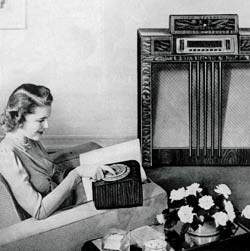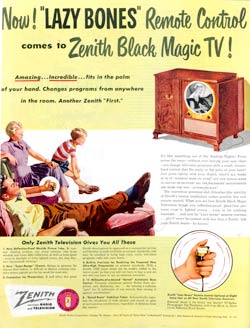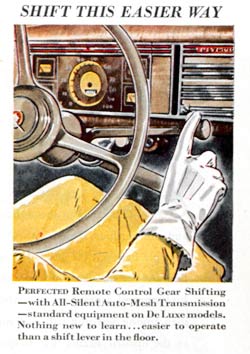Losing Touch: The Evolution of Remote Controls
The remote control for your television set has become so unremarkable, we take it for granted—until it disappears under the couch. As one of the first examples of wireless technology in the home, it was considered a great luxury when it came onto the market.
The idea for a wireless control had been in development for a long time, as you can see in the 1938 advertisement for a wireless radio controller. Philco called its “Mystery Control” —
the most miraculous radio invention since radio itself… Imagine! Remote Control, without wires or plug-in connections to radio, to electric outlet or anything else.
[Without] jumping up and running to and fro… Without moving a step… without budging from your chair… you turn the dial on the Mystery Control. Like magic, you hear the station change on the radio! You regulate volume! You even turn the radio off!
The controller worked with 11 different models of Philco radios, including the monstrous-looking console, the 116RX. The unit itself, according to the company, was no larger or heavier than a book. You can judge the size for yourself in this photo.

You carry it around as easily… place it wherever the mood strikes you—anywhere, in any room, upstairs or downstairs, as near to the radio as you wish or as far away as you can enjoyably listen.
Isn’t this the one radio comfort you’ve wished for? No more trudging back and forth to run the radio.
What about that old radio of yours, now?
It turned out that Mystery Control wasn’t the “radio comfort” everyone wanted. After three years, Philco took it out of production.
Looking back now, it’s surprising the product wasn’t successful. Philco knew this market. They’d been selling wireless remotes since 1931 in their Lazy X system:
“[S]omething really new in radio… a radio you can listen to in absolute ease and comfort. A radio that doubles the number of stations and variety of programs you enjoy—by making it so easy to change from one to another.”

Other radio makers must have sensed the demand for remote control, but they relied on the more dependable wired control. In 1950, the remote controls for RCA, Zenith, and Philco TVs were all connected by wire to the set.
Technology purists might protest that a wired controller isn’t truly “Remote Control.” But the term was formerly applied to all sorts of now-unremarkable devices. In the 1920s, the automotive industry, for example, used “remote control” to describe the hood release and door handles inside the car. And when they began mounting a transmission lever on the steering column in 1934, they referred to the new feature as “remote control gear shifting.”

POST script: The Wire Age
As we enter the wireless age, it’s interesting to read this item, written as the era of modern technology was just beginning.
Future annalists may well describe the present period of our history as the wire age. In no part of the economy of our daily lives are we divorced from wire. It is our slave, and yet an ever present master.
The editors point out to readers that they sleep on wire mattresses, eat food protected by wire screens, travel by cable car or by electric railways powered by wire, often passing over wire bridges. They announced themselves across telegraph or telephone wires, and made their way through the night streets of their city by great numbers of electric lights wired together.
Across our fields are strung thousands of miles of barbed wire. Our clocks are set by wires, our watches run by wires, our books are stitched with wires, our pictures hung by wires, and…
Wait for it…
… and our politics managed by wires.